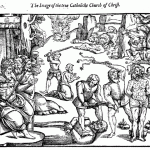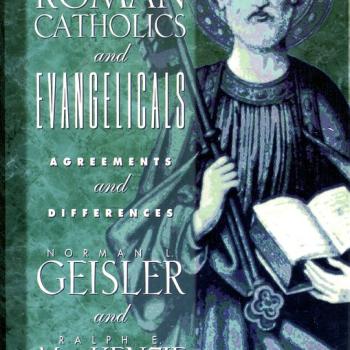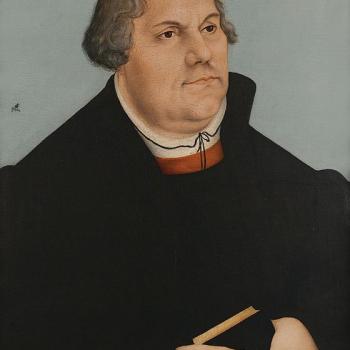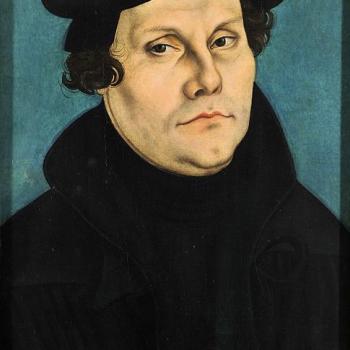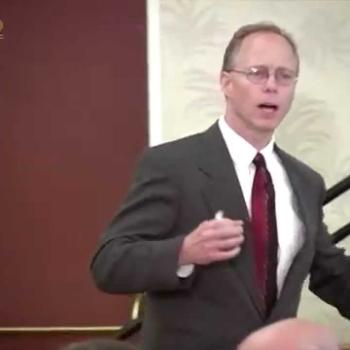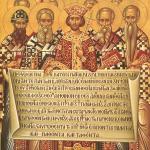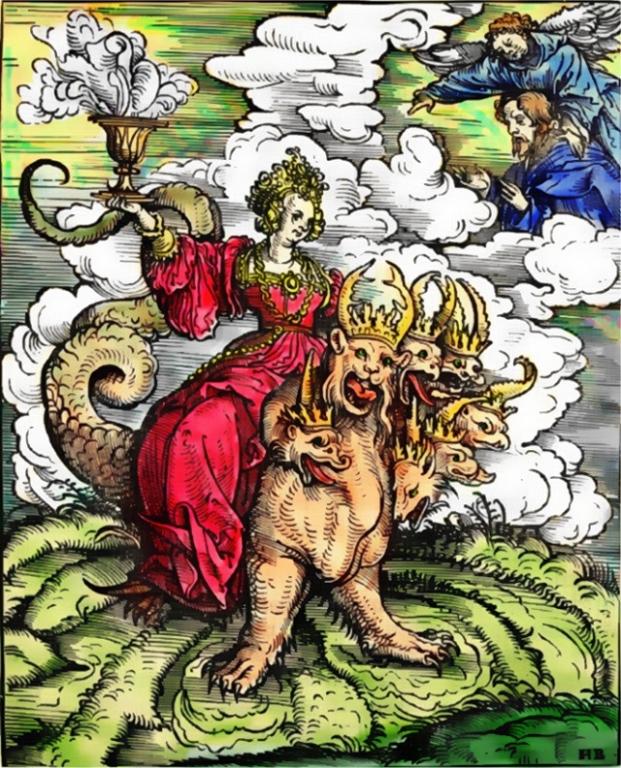
Exodus From Rome, Volume 2: A Biblical and Historical Critique of Roman Catholicism (The Scofield Institute Press, 8 April 2018), by Todd D. Baker, is the latest of a long line of anti-Catholic critiques of Catholicism (i.e., from the perspective that Catholicism isn’t a species of Christianity, and is a “false gospel”).
Dr. Todd Baker is president of B’rit Hadashah Ministries and Pastor of Shalom Messianic Congregation in Dallas, Texas. He holds a Bachelor of Science Degree in Biblical Studies, a Master of Theology degree from Dallas Theological Seminary, and a Ph.D. in Philosophy and Apologetics from Trinity Seminary under the auspices of Liverpool University at Liverpool, England. He is a professor at Scofield Bible Institute and staff theologian and writer for Zola Levitt Ministries.
Dr. Baker’s words, from his book, will be in blue.
***
Yesterday I refuted Dr. Baker’s arguments over against my own regarding tradition and sola Scriptura issues, Mary (Spouse of the Holy Spirit, New Ark of the Covenant, and Mediatrix) and his silly pretense that I supposedly define the Protestant pillar of sola fide (“faith alone”) as antinomianism (antipathy to laws and moral rules and the importance of good works).
Today I will reply to his hyper-uncharitable, uninformed, and exceedingly ignorant swipes at the reasons for my conversion to Catholicism in 1990 (a thing I have written about at length, many times). I’m the world’s biggest expert on my own motivations and internal reasoning, and I think it is reasonable to assume that Dr. Baker is not a mind-reader, nor can he read souls. He certainly hasn’t come within a million miles of understanding me. Thus, his analysis here amounts to a farce. But I’ll spend a few humorous and entertaining hours on it and move on.
Dr. Baker is critiquing the most well-known version of my conversion story, as found in the bestseller, Surprised by Truth (edited by Patrick Madrid, San Diego: Basilica Press, 1994). My original draft (Pat added a few words to it here and there) is found on my website.
Dave Armstrong was an ex-Protestant now a Roman Catholic convert since 1991. Armstrong is a published and televised Catholic apologist.
I’ve never been on television, doing apologetics. It’s curious, then, where Dr. Baker ‘found” this supposed “fact.” Perhaps if he reads this, he can enlighten us all.
He is one of the leading spokesmen for The Catholic Answers website.
The organization that Karl Keating founded is called Catholic Answers. I am not now, nor have I ever been, a spokesman for it (“leading” or otherwise). The folks at CA are my apologetics colleagues, and I have great respect for them. I’ve worked with CA on radio, in their magazine and with one book of mine that they published. But I’ve never been employed by them, and none of this makes me a “spokesman.”
He has had a website/blog, Biblical Evidence for Catholicism, since 1997. Armstrong is the author of over forty-five books such as A Biblical Defense of Catholicism, The Catholic Verses, and Bible Proofs for Catholic Truths.
It’s refreshing to see that Dr. Baker got a few facts right.
His testimony of apostasy to Rome begins with the beginnings of his childhood.
On page 242 of Surprised By Truth, Armstrong gives a revealing admission that should immediately raise a red flag to the Bible discerning Christian. He tells of visiting a fundamentalist Baptist church where he says he went up to the altar and got “saved.” But he doubts the genuineness of this simply because he lacked “the knowledge or force of will required.” First of all spiritual regeneration is not up to the exertion of human will. Scripture says it is the sovereign work of the Holy Spirit quickening the dead sinner and giving the person the supernatural will and ability to believe on the Lord Jesus Christ for salvation. Those who are truly saved and born-again by the Spirit of God are given the divine power to believe on the Lord Jesus Christ “which are “born [again] not of blood [family heritage] not the will of flesh, nor of the will of man, but of God” (John 1:12–13).
This is really stupid and inane. No one (last of all, me) is denying that salvation is by God’s grace alone. This is Catholic teaching. It’s right in the Council of Trent: if someone doesn’t want to believe my report. Every good thing whatsoever that we do is entirely caused and enabled by God’s prior grace. That’s not the issue here at all, and Dr. Baker distorts what I said (about an incident when I was 10 or 11 and abysmally ignorant of theology) to try to force it into a denial of sola gratia. To do such is dishonest sophistry.
This goes beyond Protestant-Catholic differences as regards justification, regeneration, being born again, and salvation. It’s simple common sense. I was merely saying that I didn’t know any theology at all at that point (having been raised as a nominal Methodist). I didn’t know what I was doing. I went up front because my father did, and possibly my brother Gerry. It was an impulse action (with “peer pressure” so to speak): not done in either knowledge or full sincerity. Now, it wasn’t in Surprised by Truth, but in my longest account of my conversion (in my book on that topic, and also published on my website, in ten parts), I gave a little bit more detail about this incident, in Part I:
I went up front to get “saved,” perfectly sincere (I even talked about it later with my friends), but with nowhere near the knowledge or force of will required (by more thoughtful evangelical standards) to carry out this temporary resolve. The person up front asked me to recite John 3:16, and I knew a little of it, but not the whole thing, so he had to finish it off with me.
Now, it’a beyond our purview here to get into how Protestants view such altar calls. Most would not agree with Dr. Baker that a person does nothing at all as regards salvation. Most would say we have to accept (an act of will and a “decision”) what is entirely by God’s grace, just as a prisoner accepts a pardon. We have to know something of what it entails and means. Extremely few Protestants would, for example, accept a comatose person up at the altar and declare he or she is “saved” because, after all, we humans do nothing whatever when we get saved. No! The person has to be conscious and to at least know what he is doing.
Armstrong starts off on a completely unbiblical note when assuming spiritual rebirth is dependent on the exertion of human will power.
I never claimed any such thing. This is a lie.
Hence, though he says he made a decision for Christ in 1969, there was no actual spiritual rebirth that took place, as is evidenced by the fact Mr.
Armstrong then goes on to recount how he got deeply involved with occult activity after his so-called conversion to Christ.
I did not say I made such a decision in 1969. I stated the opposite. I say that I did in 1977, when I knew what I was doing, and understood evangelical Christian soteriology. As he himself noted, in 1969 I had neither sufficient “knowledge or force of will required” and in the same paragraph I also called it a “temporary resolve.” And now, since Dr. Baker wants to make an issue of extreme [Calvinist] monergism, as if the Christian believer does nothing at all when they are saved or born again (in Protestant theology), I shall point out some inconvenient Bible passages that contradict his extreme, fringe position (even among his fellow Protestants); passages that show that we do indeed cooperate with God’s freely given grace for salvation. God causes all of it, but we still do something:
Acts 2:40 (RSV) And he testified with many other words and exhorted them, saying, “Save yourselves from this crooked generation.”
Philippians 2:12-13 . . . work out your own salvation with fear and trembling; [13] for God is at work in you, both to will and to work for his good pleasure.
Philippians 3:10-12 . . . and may share his sufferings, becoming like him in his death, [11] that if possible I may attain the resurrection from the dead. [12] Not that I have already obtained this or am already perfect; but I press on to make it my own, because Christ Jesus has made me his own.
1 Timothy 4:16 Take heed to yourself and to your teaching; hold to that, for by so doing you will save both yourself and your hearers.
Beyond this, the Bible often refers to our “working with God” or even being “co-workers” with Him:
Mark 16:20 And they went forth and preached everywhere, while the Lord worked with them and confirmed the message by the signs that attended it. Amen.
1 Corinthians 3:9 For we are God’s fellow workers; you are God’s field, God’s building.
1 Corinthians 15:10 But by the grace of God I am what I am, and his grace toward me was not in vain. On the contrary, I worked harder than any of them, though it was not I, but the grace of God which is with me.
1 Corinthians 15:58 . . . always abounding in the work of the Lord, knowing that in the Lord your labor is not in vain.
2 Corinthians 6:1 Working together with him, then, we entreat you not to accept the grace of God in vain.
Bottom line: my description of what happened in 1969 is perfectly biblical and reasonable, as is my “synergistic” soteriology, because it is entirely, thoroughly biblical, as shown. If Dr. Baker wants Bible, I gave him plenty of that (here and in my previous reply); but anti-Catholics are fully capable and willing to casually reject any part of the Bible that doesn’t conform with false tenets in their theology, derived from mere “traditions of men.”
This is made all the more evident when he does admit on page 242 that he was “like most nominal Christians.”
Exactly. I was referring to the early 70s, and back to my prior nominalistic Methodism. It’s understood (among serious, committed Christians) that “nominal Christian” means one who in fact is not a Christian, or who technically is (by various criteria: notably, baptism), but is living as if Christianity wasn’t true, or as if there is no God. That was me, till 1977. Dr. Baker skips over portions where I describe exactly how ignorant of theology I was:
. . . for the next nine years [1968-1977] rarely attended church. (p. 241)
I began to comprehend [in 1977], with the help of my brother, the heart of the gospel for the first time: what the Cross and the Passion meant, and some of the basic points of theology and soteriology (the theology of salvation) that I had never thought about before. I also learned that Jesus was not only the Son of God, but God the Son, the Second Person of the Trinity, which, incredibly, I had either not heard previously, or simply didn’t comprehend if I had heard it. I started to read the Bible seriously for the first time in my life . . . (pp. 243-244)
Thus, I was technically a Christian in terms of being baptized as a Methodist, as a baby in 1958, but I had neither interest nor commitment till 1977; thus, I was what is called a “nominal Christian” during those years. But I have also described the period as one in which I was a “practical atheist”. The late Presbyterian pastor R. C. Sproul described this condition as “when we live as if there were no God.” Bingo! That was me, too, up to 1977, and largely all the way up to 1980 when I was 22 and got really serious and “fired-up” about God.
Belief in the Gospel for salvation is a one-time experience: you can only be born-again once, and after that you are regenerated and made into a child of God for all time (see John 3).
Catholics agree. Regeneration occurs at [usually, infant] baptism. This is when Catholics believe one is “born again.” But we also believe that one can be filled with the Holy Spirit to a greater degree (as in the sacrament of confirmation), and commit oneself to Christ anew; reaffirm one’s discipleship (including, notably, in confession). I had a profound conversion experience and serious commitment to Jesus Christ in 1977, and again, far more powerfully and actually ongoing ever since, in 1980.
This is emphasized because Armstrong says he got saved again in July of 1977 (page 244).
I did no such thing. I never said 1969 was a legitimate instance of “being saved” (even as evangelical Protestants understand that). I said that I didn’t know enough on that occasion to make such a commitment or even accept God’s free gift of salvation. Nor did I say that I “got saved again” in 1977. This is an outrageous interpretation of my words. Perhaps that’s why Dr. Baker doesn’t actually cite them, so the reader can learn how I actually interpreted my experience in 1977 (he would rather spin and distort them):
It was the combination of my depression and newfound knowledge of Christianity that caused me to decide to follow Jesus as my Lord and Savior in a much more serious fashion, in July 1977 — what I would still regard as a “conversion to Christ,” and what Evangelicals view as the “born-again” experience or getting “saved.” I continue to look at this as a valid and indispensable spiritual step, even though, as a Catholic, I would, of course, interpret it in a somewhat different way than I did formerly.
Note, then, that I didn’t state here that I got “saved again.” I called it a “conversion to Christ” and explained that evangelicals think it is being born again or getting saved. I agreed with the latter description in 1977 but not now. I continue to believe that it was a valid and authentic conversion to Christ, in terms of committing my life fully to Him as a disciple.
But then he says he went lukewarm again only to yield his life completely to God in August of 1980. So it appears he got “saved” three times in a period of eleven years. Obviously, his understanding and experience of spiritual regeneration is questionable because the Bible teaches spiritual rebirth occurs once and that happens when true repentance and faith in the Gospel happens.
Let’s get this straight. The Catholic view is that I was regenerated in 1958 upon my infant baptism. I became nominal in practice up till age 18, when I had a serious conversion to Christ and committed myself to Him. Three years later I had an even more powerful, Spirit-filled renewal of my commitment in 1977, and that has lasted ever since.
In my former evangelical view I eventually came to believe in adult, “believer’s” baptism, and so did not accept my 1958 baptism on that basis. According to that outlook, I was ‘saved” in 1977, experienced a powerful “baptism in the Spirit” in 1980, and also decided to be “baptized” by immersion in 1982.
Neither view (my view then or now) entails this nonsense that I supposedly believed that I was “‘saved’ three times.” We used to see people going up to the altar every week to get “saved” at the Assemblies of God church I attended from 1982 to 1986. I used to mock and make fun of that precisely because I believed that you could only be saved once. Catholics believe, too, though, that one can fall from grace and salvation (and return back to Christ if they repent). And they do because that is a biblical position as well.
Armstrong’s devoted interest in Roman Catholicism began when he noticed how Catholics in the pro-life organization Operation Rescue were more committed than his fellow evangelicals (page 245).
I didn’t say they were “more committed.” I said they were “just as committed.” And I thought that and was surprised by it, because, as I wrote: “I had met countless Evangelicals who exhibited what I thought to be a serious walk with Christ, but rarely ever Catholics of like intensity.”
Had his interest been biblical in nature, he would have seen that the particular doctrines of Roman Catholicism militate against the teaching of the Scriptures. His interest was not biblically based, but determined only by the fact the Catholics seemed more dedicated than evangelicals. This is a dubious way to determine what is true and in keeping with the Word of God.
I stated no such thing. This is lying spin again. As I said, I didn’t say they were “more” dedicated in the first place. This was merely the spark that got me curious about Catholicism, and it provided an opportunity to talk to educated, committed Catholics for virtually the first time in my life (I can only think of one such person whom I met and talked to prior to that). All Dr. Baker wants to do is mock serious Catholics as infidels or apostate. I talked to them as human beings, because I was not anti-Catholic like Dr. Baker, though I did firmly believe that Protestantism was vastly superior.
It so happens that the issues I studied most during my conversion process were moral and historical (contraception, the religious disputes of the 16th century, and development of doctrine). But it doesn’t follow that Scripture study was not part of that. I also read (eight months before I was persuaded) books like Karl Adam’s Spirit of Catholicism (I mentioned it on p. 246) which has a great deal of Scripture. The only difference was that I was reading a Catholic interpretation for the first time. If we only read one side of a great debate, then of course we will accept that side uncritically. I believe in reading (and understanding) both sides. Bigots and narrow-minded people read only one side, or else read the “other” side in such a bigoted and biased way that they can’t even fully comprehend it, in their fog of disdain and contempt.
The next stage of Armstrong’s drift into apostasy to Rome occurred when he met and talked with two Catholic individuals who challenged him on papal and conciliar infallibility. This led Armstrong to embark on an extensive reading program of Catholic apologetic books, tracts, and materials from Catholic Answers. Never once did Armstrong hold to the reasonable doubt that there was another opposing side that has successfully answered the unbiblical claims Rome makes for itself to be totally false, which has been demonstrated from Scripture and objective history.
This is complete bull[manure]: an out-and-out lie. Far from reading only Catholic stuff, I sought out the very best anti-infallibility material I could find, because I was passionately opposed to infallibility as an outrageous, ridiculous notion. Dr. Baker completely ignores half of a long paragraph in which I described my reading of Protestant or Catholic anti-infallibility materials, so that he can hoodwink his readers into believing that I only read Catholic stuff. Here it is:
Their claims for the Church, particularly papal and conciliar infallibility, challenged me to plunge into a massive research project on that subject. I believed I had found many errors and contradictions throughout history [i.e., in Catholic doctrine]. Later I realized, though, that my many “examples” didn’t even fall into the category of infallible pronouncements, as defined by the Vatican Council of 1870. I was also a bit dishonest because I would knowingly overlook strong historical facts which confirmed the Catholic position, such as the widespread early acceptance of the Real Presence, the authority of the bishop, and the communion of the saints.
In the meantime, I embarked on an extensive reading program of Catholic apologetics books, as well as the many tracts and booklets produced by Catholic Answers. (pp. 245-246)
Dr. Baker completely (shall we say?) re-imagines the approach I took during this inquisitive year (1990), making out that I was uncritically swallowing Catholic teaching because of “smells and bells” and being impressed by a few friends in Operation Rescue (and ignoring the Bible all the while). Nothing could be further from the truth. I was fighting ferociously. And I clearly stated this in the account. But Dr. Baker chose to ignore it because it didn’t fit the myth that he sought to invent about my conversion journey:
My Catholic friend, John, tiring of my constant rhetoric about Catholic errors and [unscriptural] additions through the centuries, suggested that I read [John Henry] Newman’s Essay on the Development of Christian Doctrine. This book demolished the whole schema of Church history which I had constructed. I thought, typically, that early Christianity was Protestant and that Catholicism was a later corruption (although I placed the collapse in the late Middle Ages rather than the time of Constantine in the fourth century). . . .
Martin Luther, so I reckoned, had discovered in “sola Scriptura” the means to scrape the accumulated Catholic barnacles off of the original lean and clean Christian “ship.” (pp. 248-249; bracketed words were Pat Madrid’s additions, and brown-colored words are my own that are not in the published book)
In my much-longer, ten-part version of my story (in Part VII), I go into much greater depth about what I was reading and how zealously I fought and raged against infallibility in the middle of 1990:
I’d say, half tongue-in-cheek, “Okay, you guys can be the Church, or a Church, but you’re not infallible.” I thought that was totally out of the question: it just couldn’t be: there were too many errors, and there was the scandal of the Inquisition, and so forth.
My friend John McAlpine, whom I had met in the pro-life movement, and with whom I greatly enjoyed conversing, stunned me one night at my ecumenical discussion group when he claimed that the Catholic Church had never contradicted itself in any of its dogmas.
This, to me, was self-evidently incredible and a priori implausible, and so I embarked immediately on a massive research project designed to debunk once and for all this far-fetched notion that any Christian body could even rationally claim infallibility, let alone actually possess it. Spurred on by this “intellectual agitation,” I visited the library at Sacred Heart Seminary in Detroit, trying to shoot down the Catholic Church.
I quickly found some of the leading polemics against Catholic infallibility, such as the Irish Anglican anti-Catholic George Salmon (1819-1904), author of The Infallibility of the Church (1888) and Johann Joseph Ignaz von Döllinger (1799-1890), the German historian who rejected the ex cathedra declaration of papal infallibility and formed the Old Catholic schismatic group. His books, Letters of Quirinus and Letters of Janus, were written during the First Vatican Council in 1870.
Salmon’s work has been refuted decisively twice, by B.C. Butler, in his The Church and Infallibility: A Reply to the Abridged “Salmon” (New York, Sheed & Ward, 1954), and also in a series of articles in The Irish Ecclesiastical Record, in 1901 and 1902.
Yet Protestant apologists Norman Geisler and Ralph MacKenzie still claimed in 1995, in a major critique of Catholicism, Roman Catholics and Evangelicals: Agreements and Differences (Grand Rapids, Michigan: Baker Books, p. 206; cf. p. 459) that Salmon’s book has “never really been answered by the Catholic Church” and is the “classic refutation of papal infallibility.”
Prominent professional anti-Catholic James White, in the same year, claimed that I must have never been familiar with the best Protestant arguments against infallibility and Catholicism in general — hence my eventual conversion on flimsy grounds.
The truth was quite otherwise: the above works are the cream of the crop of this particular line of thought, as evidenced by Geisler and MacKenzie’s citation of both Salmon and [Hans] Küng as “witnesses” for their case (ibid., pp. 206-207). Church historian Döllinger’s heretical opinions are also often utilized by Eastern Orthodox apologists as arguments against papal infallibility.
Using these severely biased, untrustworthy sources, I found the typical arguments used: for example, Pope Honorius, who supposedly was a heretic. I produced two long papers containing difficult “problems” of Catholic history and alleged contradictions and so forth (just as atheists love to do with the Bible), to “torment” my Catholic friends at the group discussions. . . .
As I look back, I wasn’t being objective; I was engaging in special pleading, where one goes in with a preconceived notion and tries to find only what fits in with it. What I was trying to do, and the methodology I used, was ultimately an intellectually dishonest effort. I proceeded with my hostile research, cavalierly assuming beforehand that the early Church was much more Protestant than Catholic. I now know, as an apologist, that there are good, solid Catholic answers to all these so-called charges of heresy and massive Catholic doctrinal self-contradiction.
I was behaving very much like the big bad (cynically chuckling) “Catholic-slayer” and gadfly, who brings up all the “embarrassing” facts of the scandalous history of the Beast (though I was never anti-Catholic, just thoroughly Protestant). I was almost like two persons in one: I had great respect for Catholic moral teachings, but not nearly as much for what I thought was its checkered doctrinal and “behavioral” history.
. . . when we discussed infallibility (historical issues), I mocked and acted like an atheist who thinks he has found 3,384 contradictions on the Bible: almost all obviously fallacious when scrutinized by someone who understands the hermeneutics and exegesis of Holy Scripture. I didn’t have a clue as to how to properly interpret Church history.
We observe this sort of skeptical, “the Church was massively wrong throughout history” talk all the time, even within the Church, among so-called “progressives,” who are properly classified as modernists, dissidents, or theological liberals; for instance, Hans Küng and his book Infallible? An Inquiry (1971): another book I seized upon when warring against infallibility. There are answers to these revisionist accounts, but unfortunately, Catholics aren’t aware of them, by and large. Fr. Joseph Costanzo wrote a thorough refutation of Küng‘s book that is available online.
Apparently, for Armstrong, Roman Catholicism, not the infallible Word of God, has everything well thought-out for him, so that his apostasy to Rome was assured (page 246).
I do think that great Christian men and women through the centuries (folks like, say, The Church Fathers, and Augustine and Aquinas) have a great deal more wisdom than I do myself. But I don’t dichotomize Holy Scripture against them. It’s all a harmonious whole: Scripture-Tradition-Church. Only Scripture is inspired, but not only Scripture is infallible.
What is conspicuously noticeable from Armstrong’s testimony is that his faith is in Roman Catholicism and not the Gospel and the Holy Scriptures—a serious problem, indeed.
As I said, there is no dichotomy there. When I started very seriously studying the biblical criteria for Catholic belief (immediately after I was persuaded that Catholicism was true), in the effort to explain my conversion to my Protestant friends (what eventually became my first book), I discovered that biblical support of Catholicism overwhelming, and indeed it has been always so ever since.
One of my specialties as a Catholic apologist is “biblical evidence for Catholicism.” It’s such a blessing to be able to constantly observe the invariable superiority of the Catholic arguments from Scripture, in instances where Protestants oppose one or other of our doctrines. I’m more “biblical” than ever. Now I don’t have to ignore large portions of Scripture that don’t fit into some man-made theology. I have loved and immersed myself in Holy Scripture for now 41 years. It’s wonderful.
One intriguing factor for Armstrong that lured him to Rome was the enormous complexity of Catholicism. He even admits that Rome making a complex Gospel is a positive thing. He should have been concerned because the Gospel, though profound in its theological truths, is a simple message. Paul warns believers to beware of the work of the devil who seeks to corrupt the simplicity of Christ and the Gospel (2 Corinthians 11:3). The devil does this by adding other elements besides faith alone in Christ for salvation—and this is what Rome has done by corrupting the Gospel with other things they deem necessary for salvation—the sacraments, indulgences, submission to the pope, the Mass, and on and on has Rome corrupted the simple Gospel of salvation by faith in Christ alone. Armstrong simply traded in the biblical Gospel for the complex, unbiblical Gospel of Rome.
This is laughable and dumb (and ideally should be ignored, but — heaven help me – I’m a “completist”). He makes up this fairy-tale version of what allegedly (particularly) drove me on to the Catholic Church from these few words of mine: “it was a marvelously complex and consistent belief system unparalleled by anything I had ever encountered in Evangelicalism” (p. 246).
On page 247, Mr. Armstrong says that what further turned him away from Protestantism was their view of contraception. In terms of orthodox biblical doctrine, contraception is not a salvation issue, and to make it a major reason for accepting Roman Catholicism and shunning Bible-based Christianity is wrongly making a secondary issue in the church into a major one. The Bible nowhere mentions contraception as a necessary doctrine to believe for salvation.
It was always considered grave sin by all Christians, including Calvin and Luther. To get such a thing wrong, and to accept it at the late date of 1930 was equal parts shocking and absurd to me. It shook me to my core.
Armstrong should look into his own house and see that many Catholic layman and clergy have different views on the subject of contraception.
Yes they do. So what? All that proves is that many Catholics pick and choose what they want to believe. In other words, they think like Protestants in that respect. I’m interested in biblical and apostolic truth; not taking a head count.
But being the good Roman Catholic that he is, Armstrong agrees with the unscriptural papal doctrine that belief in and use of contraception is to commit a mortal sin, and hence to be outside of God’s saving grace in the eyes of the Catholic Church. As with many man-made traditions of Romanism, the Bible does not teach this anywhere in its pages.
I beg to differ. Both the Bible and the early Church are utterly opposed to it:
Contraception: Early Church Teaching (William Klimon)
Biblical Evidence Against Contraception
Bible on the Blessing of [Many] Children
Why Did God Kill Onan? (The Bible on Contraception)
Dialogue: Why Did God Kill Onan? (Contraception)
Biblical Data Against Contraception: Onan’s Sin and Punishment: a Concise “Catholic” Argument
The beauty and mystical qualities of Roman Catholic theology was the tipping point for Armstrong’s conversion to Catholicism (page 248). Here again his decision was not based on a sound biblical theology but strictly on the terms of what was aesthetically pleasing to his religious pallet.
This is one of many distortions that are getting very tiresome. This portion reads as follows: “My attraction to the beauty of the Church’s moral and mystical theology facilitated my conversion process.” Dr. Baker doesn’t even accurately interpret that. To say that something “facilitated” another thing is not the same as making it a “tipping point.” It just means that it helped it along. Merriam-Webster Online defines “facilitated” as “to make easier: help bring about.” “Tipping point” as defined by the same source, is a much more momentous thing: “the critical point in a situation, process, or system beyond which a significant and often unstoppable effect or change takes place.”
Dr. Baker is doing the tired canard of “smells and bells” and non-rational, non-biblical aspects as supposedly the things that drive folks to the Catholic Church: corrupt and out of their right minds. He makes this one sentence far more important than it is in the story (because it fits his cynical agenda). He also does a clever bait-and switch, because “mystical qualities of Roman Catholic theology” is not at all the same thought or idea as “beauty of . . . mystical theology.” Not all Catholic theology is “mystical.” Mystical theology is only one type of theology.
There is an additional slight problem here in that I didn’t even write this portion. Patrick Madrid added it (and this is why I have never cared for those editor’s additions, because it is my story). What I actually wrote in my draft is: “Moral theology and intangible mystical elements began the ball of conversion rolling for me, and increasingly rang true deep within my soul . . .” [italics added now] The fact that these things came at the very beginning of my journey is another proof that they were in no way a “tipping point.” The tipping point was clearly development of doctrine. Dr. Baker didn’t know what he didn’t read, but what he did read, he clearly deliberately distorted. And that stinks.
Armstrong goes on to say how reading Essay on the Development of Christian Doctrine by Cardinal John Henry Newman completed his conversion to Roman Catholicism (pages 248–249). Armstrong lauds Newman for showing in this work how Roman Catholicism was a constant all throughout the history of the church, and thus is the original faith Jesus passed on to Peter and the apostles. Armstrong’s inability to critically read this work by comparing it first with Scripture and an unbiased view of church history is quite obvious. Newman’s thesis is full of holes both theologically and historically. Rather than get into a full blown analysis and critique of Newman’s book, this author would refer his readers to several excellent critiques of Newman’s flawed thesis that expose his logical fallacies and theological errors in trying to say Roman Catholicism is the true faith, over and against to so-called recent development of Protestantism. 29
[Footnote] 29. Dr. Norman L. Geisler, “An Evaluation of John Henry Newman’s Essay on the Development of Christian Doctrine” . Retrieved on December 20, 2017; J.B. Mozley, The Theory of Development: A Criticism of Dr. Newman’s Essay on the Development of Christian Doctrine (Oxford: Rivingtons, 1878). etrieved on December 20, 2017.
It never occurred to Dave Armstrong that Newman’s book could be wrong in its claims for Roman Catholicism, because his mind was already made up by that time, and he was only interested in finding authors who already agreed with his acceptance of Catholicism.
The above fuller account of how vigorously I fought infallibility puts the lie to this fairy-tale. Dr. Baker cites Norman Geisler in his footnote 29. I already cited Geisler above, saying [in his 1995 book about Catholicism] that George Salmon’s book, The Infallibility of the Church is the “classic refutation of papal infallibility.” He also cites Salmon in the paper that Dr. Baker mentions in his footnote. It is also considered one of the big “refutations” of Newman’s theory of development.
I read Salmon’s book in the middle of 1990 because I was fighting vigorously against the Catholic Church in that respect. That’s the actual truth of what occurred. I had found a “refutation” of Newman that is considered one of the best. But here comes mind-reading Dr. Baker stating that “Armstrong’s inability to critically read this work by comparing it first with Scripture and an unbiased view of church history is quite obvious.”
Right. George Salmon was a blowhard sophist and dishonest historical revisionist, and I discovered that when I actually read Newman. But I did indeed read both sides before making up my mind. I changed my mind (which is what honest thinkers do when confronted with better evidences and reasoning). Later I wrote about how Salmon lied and lied about Newman, and above I linked to not just one, but two thorough refutations of his fanciful, special pleading nonsense.
Armstrong goes on to impugn reformer Martin Luther with the standard Roman Catholic defamatory arguments and accusations that have little historical truth or accuracy to them (pages 250–251).
No arguments are offered here, so it deserves no further comment, other than to note that I am so “anti-Luther” that I put together an entire book of his quotations, showing where he agrees with Catholics.
Armstrong cites the six-volume diatribe against Luther written by Counter- Reformation Jesuit priest Hartmann Grisar.
If by this, Dr. Baker means that Grisar lived in the 16th century, he’s wrong. His book is from the early 20th century.
From there, Armstrong says Luther was only a “revolutionary” who created a “novel theology” instead of a reformer that recovered the true Christian faith of the pre-Nicene period of the church. First, Armstrong only did his research on the side that favors Roman Catholicism and slanders the Reformers like Martin Luther.
That’s not true. Luther was my hero as a Protestant. I was an apologist then, too, and obviously read Luther. Dr. Baker mentions Bainton’s famous (and most well-known) biography [Here I Stand]. I remember reading that while my wife was driving, on the way to our honeymoon, which was in October 1984: six years before my conversion.
Secondly, he should have further read more balanced biographies of Luther and his theology. But he chose not to because he was already biased for Rome, and anyone that spoke truthfully against their false doctrines was verboten.
Yeah, I did, as just shown. The bias here is Dr. Baker’s, and those Protestants who refuse to read any Catholic material about what happened during the so-called “Reformation.” My cardinal sin was to actually read both sides. I was supposed to only read one side (as if that is honest investigation). But Bainton was actually pretty fair. He even mentioned that Luther (like Calvin) favored the death penalty for heresy [see another book where he also mentions this]: a fact that many many Protestants are unaware of or will deny (literally refuse to believe) in the face of the documented facts.
Armstrong could have also read more fair and accurate books on Luther that treat him with a balanced view, written by such authors as Roland H. Bainton, John Warwick Montgomery, Nathan Busenitz, and Martin Brecht.
I have all those (save Busenitz) in my library, and many other primary and secondary works about Luther. I also have Luther’s Works (55 volumes) in hardcover.
History has shown Luther was no novel theologian. He possessed an encyclopedic understanding of the Early Church Fathers and knew he was on solid ground when rediscovering that salvation and justification by faith alone was also taught by many of them, a truth that had long been obfuscated and denied by the church of Rome for over one thousand years. 30
I have written a ton of things about this, as seen on my Luther and Lutheranism web pages. I show where we disagree with Luther and why, and also where we (thankfully) have some significant agreements.
[Footnote] 30. There is plenty of scholarly documentation disproving Armstrong and Rome’s belabored slander Luther made up the Protestant Reformation, and that, instead, what he brought to the theological forefront was in fact taught by Jesus, the New Testament, and the early church fathers. See the following works proving this: Nathan Busenitz, Long Before Luther (Chicago: Moody Publishers, 2017); Terry L. Johnson, The Case For Traditional Protestantism: The Solas of the Reformation (Carlisle, PA: Banner of Truth, 2004; Anthony Dodgers, “Lutherans and the Early church fathers” at https://lutheranreformation.org/history/lutherans-early-churchfathers/. Retrieved on December 20, 2017. One can peruse many of the Reformation articles on the Protestant doctrine of justification by faith alone originating from Scripture and taught in the early church compiled by Dr. C. Matthew McMahon at http://www.apuritansmind.com/justification/the-early-church-and-justification-compiled-by-dr-c-matthew-mcmahon/. Retrieved on December 20, 2017.
Where Catholics and Lutherans disagree, the Church fathers support Catholic views, as I show in many papers on my Lutheranism and Fathers of the Church web pages. I’ve also edited three books of the Church fathers’ writings (one / two / three): showing that they support Catholic positions all down the line. This includes (very much so) St. Augustine: Protestants’ favorite Church father, by far.
Armstrong’s hypocrisy is never more seen than here. Despite some of Luther’s personality flaws, Mr. Armstrong apparently has no issue with the terrible crimes the Roman Catholic popes and its clergy have committed for centuries. The Roman Catholic Church reeks of criminal behavior. We have the papal pornocracy of the tenth century, the Crusades, the Inquisition, along with the sordid and massive crimes and felonious behavior of past popes, and the ongoing, pervasive problem of pedophilia in the priesthood, which far exceedingly eclipses any personal foibles of Luther. The sword cuts both ways, Mr. Armstrong—and history colorfully records its far, far worse for the corrupt self-serving papacy and its priests than for any of the Protestant Reformers.
I have a web page about that, too. And I dare to also have a page about Protestant persecution and intolerance and sins, and lots of related material on my Luther, Lutheranism, Calvin, Calvinism, and Anti-Catholicism web pages. I write about things such as ridiculously inflated, made-up figures of deaths in the Inquisition, and the myriad lies in Foxe’s Book of Martyrs. Nice try, though. I’m the very last person Dr. Baker wants to run into if the discussion turns to “skeletons in the closet.” Surprise! Protestants have plenty of their own, too, believe you me.
Even in the disturbing light of the infamous history of the Roman Catholic Church and her popes, Mr. Armstrong has the unmitigated gall to then say that it was out of “an intellectual and moral duty” he abandoned Bible-based evangelical Protestantism to embrace the apostasy of Roman Catholicism.
That’s correct: based on the Bible, history, and reason. There are sinners everywhere. Dr. Baker won’t be able to escape that fact. It’s a thing called original sin; and another called concupiscence.
On the contrary, had he the intellectual honesty and a real moral conscience, Mr. Armstrong could in no way embrace the unscriptural mess that is Rome—he did so for personal, emotional, and aesthetic reasons, not ones based on biblical truth and moral integrity.
These are flat-out lies and slanderous accusations; calumnies. I’ve told the real story here and in many other accounts of my conversion.
Armstrong fools no one who has the Holy Spirit and the Scriptures at hand to read by His illuminating guidance. And from that platform,
Armstrong’s decision was an act of apostasy and rejection of the biblical gospel for the counterfeit Gospel of Rome.
Dr. Baker is welcome to try to refute one or more of my hundreds of articles defending Catholic theology from Holy Scripture (and early Church history, as the case may be). And I predict that his performance — should he decide to do so — will (almost certainly) be as pitiful and pathetic as what any fair-minded reader can immediately observe of his foolish and silly efforts, above.
***
Photo credit: The Whore of Babylon; sitting on the seven-headed beast, St John and the angel looking on from a cloud in top right corner, by Hans Burgkmair the Elder (1473-1531). Colorized; from a series of 21 woodcuts of the Apocalypse for Martin Luther’s translation of the New Testament (Augsburg: S. Otmar, 1523). [public domain / Wikimedia Commons]
***


